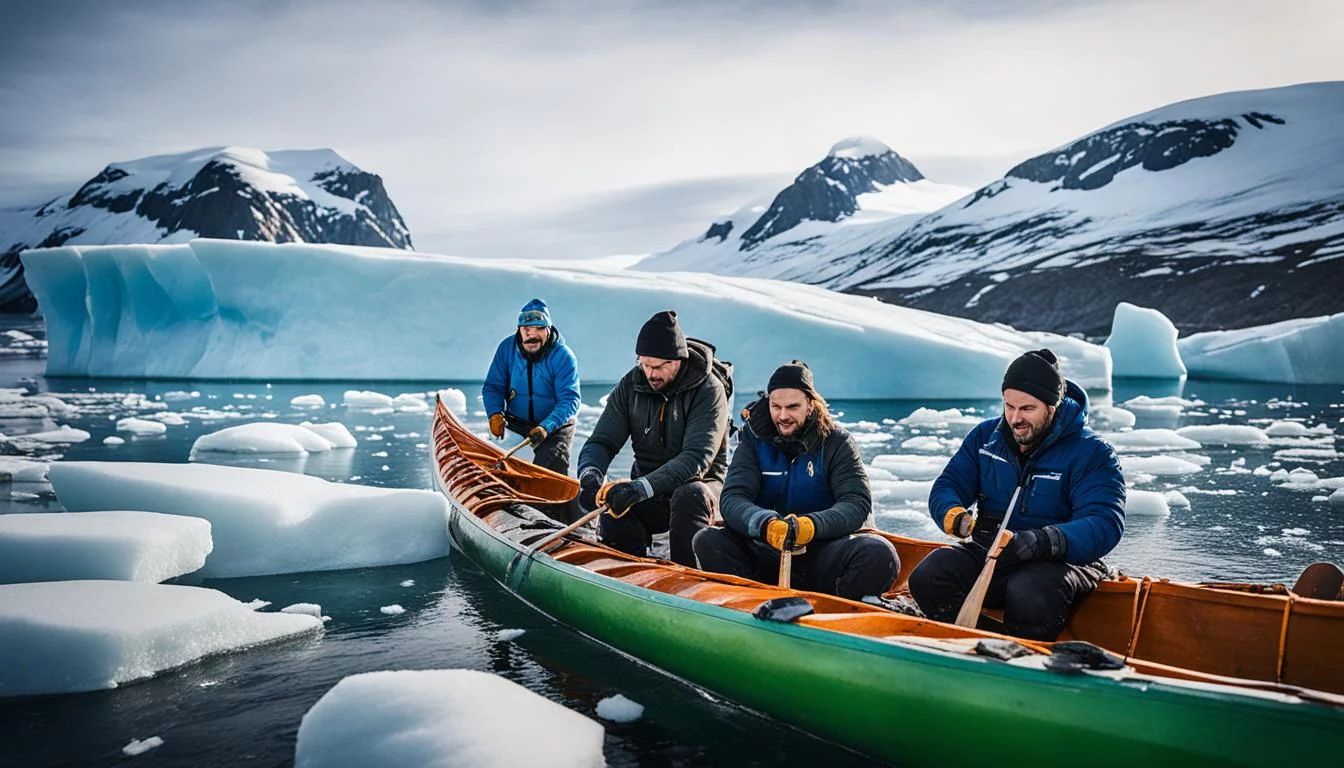Living on the Ice Edge: Insights into Greenlandic Culture and Traditions
Do you find Greenland mysterious with its icy lands and distant, small communities? There’s more to learn about its rich culture and traditions. Are you excited to delve into the secrets of Greenlandic life?
Greenland is known for its extreme Arctic climate. Over time, the people there developed a unique culture. This culture has roots going back over 4,500 years when the first Inuit arrived.
The story continued when the Thule culture joined around 1,000 years ago. This mix of peoples’ traditions formed today’s Greenlandic culture. Norse immigrants from Europe also influenced Greenlandic life between 982 and 1500.
About 56,500 people now live in Greenland. Most live in 16 towns in the warmer south and west. They speak Greenlandic, which is close to other Inuit languages, and Danish.
Greenlanders feel a deep bond with their environment and their ancestors’ way of life. They cherish their traditions, such as hunting and fishing. Even in small communities, these practices and the culture thrive.
So, what makes Greenlandic culture stand out? Let’s take a closer look at what makes this Arctic nation’s way of life so unique and interesting.
Key Takeaways:
- Greenland’s culture has been shaped by the extreme Arctic living conditions.
- The population is a mix of different peoples who have adapted to life in the Arctic over the centuries.
- Immigration to Greenland happened in waves, with the first Inuit arriving approximately 4,500 years ago.
- The present population is largely descended from the Thule culture and the Norse immigrants.
- Approximately 56,500 people live in Greenland, with the majority residing in 16 towns along the south and west coast.
The Unique Lifestyle in Greenland
Greenland’s way of life is one-of-a-kind, shaped by its huge natural spaces. Its people live along a coast as long as Europe. They’ve built a strong resilience and adaptability. Most people, about 89%, are born here. The rest, about 11%, come from places like Denmark. They speak the Greenlandic language, Kalaallisut, along with Danish and English. Despite being modern, Greenland values its old ways and its link to nature.
“Our community bonds are strong, and we rely on one another for support in this challenging environment,” says Anna Hansen, a resident of Nuuk, Greenland’s capital city. “We’ve learned to live harmoniously with nature, adapting our lifestyles to its whims.”
The people in Greenland respect the elements and find peace in nature’s vastness. They modernize keeping their ancient customs alive. For centuries, hunting and fishing have been key, bringing food and tight community ties. In small towns, these traditions show how deeply they care for the land.
Preservation of Greenlandic Language
Greenlanders hold their language, Kalaallisut, close to their hearts. They use it daily and in important settings. Even with Danish and English around, they see their language as key to their culture.
A Modern Society Rooted in Tradition
Greenland is changing fast these days, offering new chances and adjustments. Yet, Greenlanders blend new and old well. Technology, better roads, and companies have come without erasing their lifestyle. Instead, they’ve made the community stronger and tougher against nature’s tests.
“We have adapted to the demands of the modern world while still valuing our traditions,” explains Erik Møller, a resident of Sisimiut. “Our society is a unique blend of old and new, with a deep appreciation for our heritage.”
The Greenlandic way of living is a lesson in sustainable living. It shows how people and nature can live well together. As their world changes, they keep their traditions alive. At the same time, they look to the future with hope.
| Aspects of Greenlandic Lifestyle | Description |
|---|---|
| Community Bonds | Greenlanders rely on strong community bonds for support and resilience in their challenging environment. |
| Nature’s Whims | The Greenlandic lifestyle is shaped by the unpredictability and grandeur of nature, fostering a deep respect for the elements. |
| Greenlandic Language | The native language, Kalaallisut, is widely spoken, preserving cultural heritage and fostering a sense of identity. |
| Modern Society | Greenland has adapted to modern amenities while preserving traditional practices, showcasing the integration of old and new. |
Preserving and Celebrating Greenlandic Culture
Greenlanders are proud of their culture. They keep alive the Inuit traditions that have been with them for ages. They still hunt and travel with kayaks just like their ancestors. This shows a strong link to their past.
Christianity is the main religion in Greenland. Every town has a church for people to worship. The National Day is on June 21st. It includes parades and services. Everyone enjoys traditional food at open houses on this day.
Greenlanders love kaffemik, coffee gatherings. These are chances to meet others, share stories, and learn about life in Greenland. People are very welcoming at these events.
National costumes are very important. They are worn for special occasions, showing the bond and pride in Greenland’s past. It helps tell the story of their unique culture.
Greenland’s culture is vibrant and rich. They celebrate their history with Inuit ways, special events, coffee gatherings, and unique clothing. Even as times change, Greenland’s identity stays strong with its deep-rooted traditions and values.







